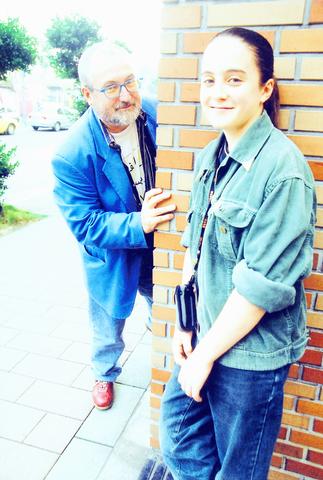Talking with Clemens Klopfenstein in Taipei, it's difficult to associate him with his latest film Who Afraid Wolf (Wer Angst Wolf), which plays tonight at 7pm at the Golden Horse Film Festival.
The Swiss-born, Italy-based director appears sanguine, always smiling, and has a playful attitude for the cameras taking pictures with his 13-year-old son.

But it probably takes a more sensitive eye and a theatrical appreciation, preferably in classic drama, to view Klopfenstein's disjointed version of Who's Afraid of Virginia Woolf.

PHOTO: NIEN KENG-HAO, LIBERTY TIMES
"It is an experimental documentary, with famous actors playing actual drama in it," said Klopfenstein, defining his film.
Eight groups of people, all theater actors, are on the way to Rome, where they are going to meet Mr. Baumann at the city's Goethe Institute. The subtext "all roads lead to Rome" is evident early in the film.
The traveling actors are converging on the city in cars, vans and buses. The road signs indicate Rome as being to the right and then left. They are somehow incapable of making it to Rome, either through having taken a wrong turn, getting lost, getting into a fight on the road, or being stuck in a snowstorm. They all have to constantly call Rome, saying they will be late, that they got stuck, and so on.
The actors, including Bruno Ganz and Tina Engel, are rehearsing their roles and quoting passages from classics by Shakespeare, Shaw, Chekhov and from Who's Afraid of Virginia Woolf by Edward Albee. They rehearse by the beach, inside cars, on the grass, in a small grocery store by a village and on snowy mountain sides. Sometimes they are just reciting the lines, sometimes they are really acting as if they were on stage. And very often, these groups of two, three or four people, have their personal problems between each other, and end up venting emotions during the rehearsals. The rehearsal segments reflect the actors' emotional turmoil, making it difficult for viewers to distinguish what is real acting and what is not.
Klopfenstein said it was unclear if the actors were rehearsing or expressing their genuine emotions through reciting the classic lines. "This was a challenge I faced during shooting and something I would like to present in the film," he said.
In a way, the whole film can be seen as another version of Waiting for Godot -- nobody reaches Rome, but they all act out excellent drama on the road. There are several couples rehearsing the classic argument scene in Who's Afraid of Virginia Woolf, but in this case it's in different languages, different locations and with different moods, adding different layers of dynamics between the couples.
One of the film's creative experiments is to create a kind of theater sensation in the wilderness of the Italian countryside near Rome. "It's like culture crashing against the wilderness, through the passing of landscapes," Klopfenstein said.
The landscapes at least provide some visual diversion that the audience can appreciate even if not familiar with the classic playwrights and their works.
"Just listen to the talk and follow the looks," he said.
Klopfenstein's preference for fragmented, improvised aesthetics is probably related to his other identity as a painter. Making this film, he said acted like a painter, first collecting the desired colors on the pallet and then beginning to paint only when inspired by the colors before him. Apart from being a prize-winning painter, he has also been a cinematographer for 30 years. His previous film Silence of the Men, a winner of the Swiss Film Prize, is a hilarious film shot in Egypt about a bunch of men babbling about their women problems.

On April 26, The Lancet published a letter from two doctors at Taichung-based China Medical University Hospital (CMUH) warning that “Taiwan’s Health Care System is on the Brink of Collapse.” The authors said that “Years of policy inaction and mismanagement of resources have led to the National Health Insurance system operating under unsustainable conditions.” The pushback was immediate. Errors in the paper were quickly identified and publicized, to discredit the authors (the hospital apologized). CNA reported that CMUH said the letter described Taiwan in 2021 as having 62 nurses per 10,000 people, when the correct number was 78 nurses per 10,000

As we live longer, our risk of cognitive impairment is increasing. How can we delay the onset of symptoms? Do we have to give up every indulgence or can small changes make a difference? We asked neurologists for tips on how to keep our brains healthy for life. TAKE CARE OF YOUR HEALTH “All of the sensible things that apply to bodily health apply to brain health,” says Suzanne O’Sullivan, a consultant in neurology at the National Hospital for Neurology and Neurosurgery in London, and the author of The Age of Diagnosis. “When you’re 20, you can get away with absolute

May 5 to May 11 What started out as friction between Taiwanese students at Taichung First High School and a Japanese head cook escalated dramatically over the first two weeks of May 1927. It began on April 30 when the cook’s wife knew that lotus starch used in that night’s dinner had rat feces in it, but failed to inform staff until the meal was already prepared. The students believed that her silence was intentional, and filed a complaint. The school’s Japanese administrators sided with the cook’s family, dismissing the students as troublemakers and clamping down on their freedoms — with

As Donald Trump’s executive order in March led to the shuttering of Voice of America (VOA) — the global broadcaster whose roots date back to the fight against Nazi propaganda — he quickly attracted support from figures not used to aligning themselves with any US administration. Trump had ordered the US Agency for Global Media, the federal agency that funds VOA and other groups promoting independent journalism overseas, to be “eliminated to the maximum extent consistent with applicable law.” The decision suddenly halted programming in 49 languages to more than 425 million people. In Moscow, Margarita Simonyan, the hardline editor-in-chief of the